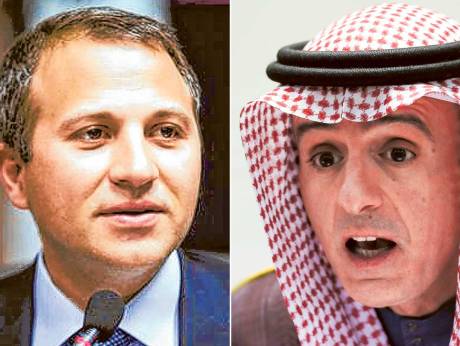
Joseph A. Kechichian, Senior Writer
Beirut: A regularly scheduled League of Arab States (LAS) meeting in Cairo this coming Thursday may further exacerbate Lebanon’s ties with Gulf Cooperation Council (GCC) states in general and with Saudi Arabia in particular, as rumours fly that the LAS could issue an expulsion warning if Beirut fails to dissuade Hezbollah from its active participation in several regional wars at Iran’s behest.
According to the Al Nahar daily, Egyptian officials are trying to set up a meeting between Lebanese Foreign Minister Jibran Bassil and his Saudi counterpart, Adel Al Jubeir, to see whether growing tensions between the two countries could be rolled back from the current high levels of antipathy.
Efforts to de-escalate have failed so far and it is unclear whether the air of unease will clear given that the GCC classified Hezbollah as a “terrorist” group.
Lebanon is sharply divided over the party’s adventurism throughout the region, especially over its direct involvement in the Syrian civil war as Tehran’s shield, even if Secretary-General Hassan Nasrallah claims that his group is fighting terrorists.
Most Lebanese political figures are dejected at their inability to persuade Hezbollah to place the country’s interests ahead of Iranian ones.
Against this level of bravura, GCC states followed Riyadh after the latter ended a $4 billion (Dh14.68 billion) military aid package to purchase French equipment for the Lebanese Armed Forces, in protest against Hezbollah’s direct involvement on several battlefronts, including Iraq, as publicly acknowledged by Nasrallah yesterday.
Foreign Minister Bassil, who failed to back Riyadh in two key votes, first in early January at the LAS and the second a few weeks later in Jeddah at the Organisation of Islamic Cooperation, left the impression that Lebanon aligned itself with Iran against fellow Arab states.
He claimed that the votes were necessary to maintain national security although it was not necessarily in the country’s strategic interests.
According to Al Nahar, Prime Minister Tammam Salam is trying to coordinate with Bassil on Lebanon’s official stance before the minister returns to Cairo, precisely to avoid another diplomatic scandal, although the paper further reported that Riyadh would seek the issuance of a formal warning to Beirut for an eventual expulsion from the League if need be.
Such a step, if it ever materialises, will mean that Lebanon and Syria — two founding LAS members — would have been expelled from the regional collective security organisation on account of the harm that Beirut and Damascus allegedly may be causing to Arab values.
There are concerns that if Lebanon persists in allowing Hezbollah a relatively free hand to manoeuvre on the domestic checkerboard and, more importantly, to continue its military deployments both on the Arabian Peninsula as well as in Syria and Iraq, GCC states may take further steps against Lebanon beyond a putative expulsion from the League.
Saudi Arabia has already called on its citizens to end or severely curtail their travels to the country for safety reasons and hinted that it might withdraw significant financial deposits from the Lebanese Central Bank.
Other Gulf countries issued similar warnings, with the UAE banning its citizens from travelling to Lebanon altogether as well as withdrawing an undetermined number of diplomats from the country. The fate of nearly 750,000 Lebanese working in GCC countries may also be in jeopardy.



